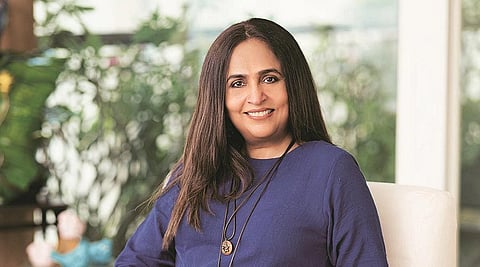

Writer-producer Shailja Kejriwal has been the igniter behind Zee network’s channel Zindagi which introduced Indian audiences to the calm beauty of Pakistani serials. Her recent show, Qatil Haseenaon Ke Naam, a neo-noir driven by women scorned and scented in the aroma of Urdu poetry, won the Asian Academy Creative Award 2022 for ‘Best Anthology’. We spoke to her about how the show came to be, her fears about the channel amidst boycott trends and her memories with the late Irrfan Khan.
First of all, congratulations to you and the whole team of Qatil Haseenaon Ke Naam for winning the Asian Academy Creative Award for ‘Best Anthology’. How did you feel after receiving the honour?
It was very emotional. We have been working for 10 years at Zindagi to bring artists from across the border. It feels like the persistence and hard work of all these years paid off. At the event, we saw other shows and it was an amazing experience. It was an exhilarating night and for two days it didn’t sink in for me that we won.
How did Qatil Haseenaon Ke Naam come to be? What did you like about the series to back it up?
At Zindagi, the process is a little different. We don’t approve concepts and finalise a show. We actually identify directors and writers with whom we would like to work. We see their past work and what they stand for and then we have conversations with them to collaborate on something that excites us both. For me, I want to know about a director’s voice and not about say the 25 scripts he or she has written. If that voice resonates with us and we can do something with it that becomes universal, we go forward with it. I always believe that I am not unique and if I like something there will be other people who like it too.
When it comes to Qatil Haseenaon Ke Naam, what was this “voice” that pulled you into the show?
The director Meenu Gaur and I had long discussions. We were talking about the suppressed rage of women. We, as women, in our personal sphere, in our jobs, and in our married lives go through a lot and we are not supposed to react. She told me her story and I told her mine and we realized that there is a lot of rage inside us that needed to be voiced. We both love the Noir genre and wanted to turn it on its head. Usually, Noir is told from the male point of view and women are objectified, we wanted to change that.
You have been the force behind the Zindagi channel which suffered a setback after the 2016 Uri attack and stopped airing Pakistani content. Later, it became a digital-only channel. How did you deal with this?
When we started Zindagi, we knew it wouldn’t have a smooth sail. We knew that this brand would go two steps forward and one step back but it was important that it keeps on moving ahead.
When something like this happens between two countries, the trust between its people wobbles a bit. But still, we were interacting with their artists across the border. We discussed work and in between, we talked about what was happening between the countries. This is what I consider an achievement, that whatever happens around politically, artists across borders converse with each other.
In today’s scenario when anything gets boycotted on Twitter, like for example Pathaan and a perception is being made against certain minorities, do you feel apprehensive about the fate of Zindagi?
These days anything can be boycotted, so I won’t even consider it unique if people start boycotting us (laughs) This whole Pathaan controversy is ridiculous and stupid. You can ignore these discussions or fight them but you can’t give in to them. I feel now the tribe of people against whom boycott calls are being made have increased and I don’t feel alone anymore.
You have worked with the late Irrfan Khan on Qarib Qarib Single and Madaari. Can you share some memories of him?
There are a lot of memories of him, but I remember him, particularly for his generosity. Before Madaari happened, I had left television and was clueless about what to do and then he called me and asked me to write something for him. Amidst his busy schedule, he still remembered that I was sitting at home, unemployed. I gave him two-three ideas and he chose Madaari. He became the backbone of the project, chose the director and basically took care of everything.